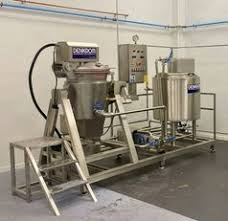![]()
If you’ve landed on this article page, you’re probably searching for a
good business idea—an idea that’s light on the pocket but heavy on
returns, promising both a fulfilling journey and potential profit.
|
How to start Cheese Production Business in Nigeria
Cheese, one of the world’s most beloved dairy products, holds
immense potential in Nigeria’s agricultural and food processing
sector. Its rich nutritional content and versatile applications
make it a staple in various cuisines, offering promising
business opportunities for entrepreneurs.
With a burgeoning middle class, increasing demand for dairy
products, and an underutilized local dairy industry, cheese
production is an attractive venture for Nigerian agripreneurs.
In Nigeria, cheese production has traditionally been limited to
local varieties like “Wara,” a soft cheese made from cow milk,
common among Fulani communities. While traditional cheese-making
remains significant in rural areas, the demand for processed and
specialty cheeses has surged in urban centers, paving the way
for modern cheese production.
Cheese is broadly categorized into several types based on
production methods, source of milk, and texture:
Natural Cheese: Made from milk without additives, this category
includes Cheddar, Mozzarella, Parmesan, and Feta.
Processed Cheese: A blend of natural cheeses mixed with
emulsifiers and preservatives, making it ideal for convenience
foods.
By Source: Cheese can be animal-based (cow, sheep, goat, camel
milk) or plant-based (soya, almond, cashew).
By Form: Cheese is available as blocks (hard and soft),
spreadable, and other forms, catering to various culinary needs.
Raw Materials for Cheese Production in Nigeria
Milk: The primary raw material, sourced from cattle, goats, or
sheep. Nigeria’s local dairy farms are key suppliers.
Coagulants: Enzymes such as rennet or plant-based acids like
lemon juice are essential for curdling milk.
Salt: Used for flavoring and preservation.
Cultures: Starter cultures introduce beneficial bacteria to aid
in fermentation and flavor development.
Additives: Optional ingredients like herbs, spices, or food
coloring for specialty cheeses.
However, Nigeria’s dairy industry is growing, supported by
government initiatives to enhance local milk production and
reduce import dependency. Entrepreneurs investing in cheese
production can leverage these developments to create
high-quality, locally produced cheeses.
Local producers, particularly in rural areas, focus on
traditional cheese varieties like Wara. Some small-scale
ventures in urban centers have begun experimenting with
processed cheeses, though on a limited scale. Larger dairy
companies, while primarily focused on milk and yogurt, have the
potential to diversify into cheese production, given the right
incentives and market demand.
The demand for cheese in Nigeria is growing, driven by factors
such as urbanization, exposure to international cuisines, and
the increasing popularity of fast food. Hotels, restaurants, and
bakeries are significant consumers, using cheese in pizzas,
sandwiches, pastries, and more.
Additionally, Nigeria’s young population, with a penchant for
convenience foods, is fueling demand for snackable and processed
cheeses. While imports currently meet most of this demand,
locally produced cheeses have the potential to capture
significant market share, especially if positioned as
affordable, high-quality alternatives.
Cheese production in Nigeria offers a unique opportunity to
diversify the country’s agricultural and food processing
sectors. By tapping into the growing demand for dairy products
and leveraging local resources, entrepreneurs can build a
sustainable and profitable business. While challenges such as
limited infrastructure and consumer awareness exist, the
industry’s potential for growth and innovation makes it a
promising venture.
With the right strategies and investments, Nigerian cheese
producers can cater to domestic and international markets,
contributing to the nation’s economic development and food
security.
Get our practical guide on Cheese Production Business in
Nigeria. If you require a bankable feasibility report on cheese
production in Nigeria, please contact us
|







